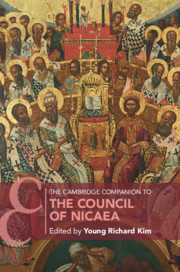Book contents
- The Cambridge Companion to the Council of Nicaea
- Cambridge Companions to Religion
- The Cambridge Companion to the Council of Nicaea
- Copyright page
- Dedication
- Contents
- Figures
- Contributors
- Acknowledgements
- Abbreviations
- 1 Introduction
- Part I Contexts
- Part II The Council
- Part III Outcomes
- 7 The Creed
- 8 The Twenty Canons of the Council of Nicaea
- 9 The Council of Nicaea and the Celebration of the Christian Pasch
- 10 Narrating the Council
- Part IV The Aftermath
- Part V The Long Reception
- Appendices
- Bibliography
- Index
- References
10 - Narrating the Council
Eusebius on Nicaea
from Part III - Outcomes
Published online by Cambridge University Press: 17 December 2020
- The Cambridge Companion to the Council of Nicaea
- Cambridge Companions to Religion
- The Cambridge Companion to the Council of Nicaea
- Copyright page
- Dedication
- Contents
- Figures
- Contributors
- Acknowledgements
- Abbreviations
- 1 Introduction
- Part I Contexts
- Part II The Council
- Part III Outcomes
- 7 The Creed
- 8 The Twenty Canons of the Council of Nicaea
- 9 The Council of Nicaea and the Celebration of the Christian Pasch
- 10 Narrating the Council
- Part IV The Aftermath
- Part V The Long Reception
- Appendices
- Bibliography
- Index
- References
Summary
A key figure in the Arian dispute leading up to and following the Council of Nicaea, Eusebius of Caesarea (bishop c. 313-39) was not only implicated as a central player in the broader theological developments of the early fourth century but was also one of the most significant formulators of ancient literary representations of the council itself. His writings contain an eye-witness account of the council; a broader narrative of Constantine’s interactions with Christian bishops; letters of Constantine addressing issues of theological or practical debate; his own letters to his home congregation at Caesarea and to other bishops involved in the controversy; and his theological polemic against Marcellus of Ancyra, the promoter of a more radical anti-Arian position. These texts simultaneously assist and complicate modern attempts to construct the precise nature and dynamics of the controversy, the council, and its aftermath. They also provide a fascinating angle by which to discern important features of Eusebius’s fertile authorial work: he stands as a careful and creative formulator of a powerful historiographic, theological, and political vision that would make a signal impact upon later competing accounts of the Council of Nicaea.
Keywords
- Type
- Chapter
- Information
- The Cambridge Companion to the Council of Nicaea , pp. 202 - 222Publisher: Cambridge University PressPrint publication year: 2021



